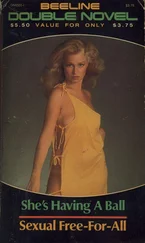He sent his dad a postcard with a picture of Old Ironsides , and wrote, “Going for last 12 credits, bring you degree in person next Feb. Love, Gene.”
He got back a plain card, the kind without any picture on it, that said, “Don’t give up the ship. Love, Dad.”
Shit, the old man had a right to pull his leg a little.
He promised himself when he got the degree and took it out to Dad in person he would also stay awhile, take the old man to a ball game, take him out fishing like the old man had taken him so many times growing up.
He wondered where the hell you went fishing in Chicago.
Gene and Lou weren’t the only ones making plans. The spirit that started with “Here Comes the Sun” seemed to be like a contact high, lifting and energizing all of them, moving them out of old ruts, picking up promises dropped.
Barnes had really started hanging out at Harvard and making notes for his new mystery. He wasn’t just pissing his time away in the Harvard Square coffeehouses either, he was catching some lectures, sitting in on seminars, going for beers with students and faculty. He had even come up with a title for the book: Congealed in Crimson . He said that’s what the place did to people’s brains. From his personal contact with Harvard he had come to hate it but he said that was good as far as hyping up the old inspiration. He had rented a one-room cottage on Cape Cod for the summer because he learned that’s what writers who lived in Boston were supposed to do and he was trying to get things right.
He wanted Nell to come and stay in the one-room cottage with him, knowing of course he’d have everything taken care of that way but she had already got a social work gig in Appalachia for the summer, taking on a larger if less compact depressed area than Barnes. He moaned and grumbled but Nell said she knew he could do it he had done it before and besides, she’d be back from the field in September and ready to resume operations as his own special caseworker.
Flash was going up to make a pile selling aluminum siding in the boondocks of New Hampshire, Maine, and Vermont. It turned out this was the secret of his seemingly miraculous ability to put all he had in some crazy scheme, blow the whole thing, and be back on the scene again a few months later with a bankroll to launch still another grand venture. He would go up and live on a couch in the game room of his sister-in-law in Nashua, New Hampshire, and with this low-overhead base of operation blitz the boonies with his high-powered sales of aluminum and vinyl house siding. He was a natural salesman and always did well enough to come back and launch a new scheme designed to make him a tycoon in whatever new enterprise caught his fancy. Who knew what next? Maybe solar energy, he mentioned reading an article …
The only one who didn’t have any plans for the summer was Thomas, who didn’t want any. When Gene thought of getting through the summer alone and Thomas the only friend left in the city he got real down, so he tried not to think about it. The summer was still a month off and he might as well groove on the time he had with Lou till she went off to Arkansas.
Ever since Gene’s narrow escape from the draft Lou had gotten into doing antiwar stuff, she said that whole number they went through had really brought it home to her: how it felt to face going off to fight and maybe die for what you thought was wrong.
Gene believed all that in his head but as much as he thought the war sucked he couldn’t get into working against it. He felt kind of silly and phony doing political stuff, like he was out of place or something. He knew all the people his age were supposed to be political but he rarely ran into them personally. He had known this couple once, though, who were real radicals. Patrick and Laurinda. They went all over the country organizing against the war, living off donations they got passing a tin can around. Then they happened to hear one of these kid maharishis and decided what they’d been doing was just an ego trip. They ended up in Vancouver, making cheese. Gene ran into a guy who had been there and seen them. He said they were fine, but awfully quiet and subdued, which was probably because of their deep religious experience.
“This cheese they make,” Gene had asked. “Is it any good?”
“Damn good. People like it.”
“Well, good for them. You know?”
That was how he felt about it.
Lou didn’t press him to do any antiwar things with her until it came to Tricky Dick invading Cambodia, and that really pissed her off. Most of the universities in Boston were going to Strike and a big protest march was scheduled that Lou said Gene really had to go along with her on.
It turned out to be a beautiful early May day and the whole thing had a kind of holiday spirit. Flags whipped in the wind, like clean washing. The air was crisp, the sky unblemished. As the marchers went down Beacon Street people waved from the sidewalk and some joined in. Dogs and children would follow for a while, then drop away, and others sprang up to tag along. A chant would rise from a few, and then rise and spread, sweeping the march: “Hell, no, we won’t go!” Lou took Gene’s hand and squeezed. Gene squeezed back. Another chant rose, insistent, pressing: “Peace now , peace now , peace now …” It was hard to believe such a march would not end it. Stop the bombing, stop the war, stop the slaughter. So many people, good people, marching in concert, in common cause. Gene looked back and saw the ranks filling Beacon Street all the way up past Charles to the top of the Hill and the State Capitol building. Its gold dome shimmered, radiant with history and promise.
Gene felt a tingle, found himself thinking: Here comes the sun .
When summer came and Lou left, Thomas fell by and he and Gene smoked a joint, mostly in silence. With Lou not there, they didn’t have much to say to each other. After the joint Thomas said he had a big deal he had to bring off next morning, he’d better split. Gene wished him luck.
Gene had forgot what a drag it was living alone. He ate out of cans because it was quicker, sometimes forgot to eat at all. Had a pickle and a beer. Whenever he was in the apartment he kept the radio tuned to a twenty-four-hour news station. He wanted only words, not music. The repetitive babble helped stuff the empty space in his head like wads of cotton.
Reminders of her stung him, unexpected. Reaching in the closet for a shirt and feeling the touch of her winter dresses made him swallow. Her new issue of Harper’s Bazaar arrived in the mail, not knowing the difference. He slipped it out of sight in a pile of other magazines.
He was working the night shift at The Crossroads which was better than anyplace else he knew but in spite of the mechanically frozen air the job seemed stickier, more closed in. The drunks were sloppier, the old guys morose.
He hung in there, though, hitting the books, making every class, meeting all assignments no matter how chicken-shit. He didn’t just want to squeak through it, he wanted to do it right, make her proud of him.
There were showers in the afternoon, and at night the wet grass of Fenway was essence of green in the floodlights. Flash had called to say he was coming down from his sales job in New Hampshire with a couple of tickets for the Yankee game if Gene could get off. He traded a shift with Kevin, the other bartender, and sat with Flash above the left-field wall, where you could almost reach down and tap Tommy Harper on the shoulder when the Sox were in the field. At matchbox-size Fenway you could still feel part of it, not just a dot in some impersonal super-stadium. Balancing a tall waxy cup of beer and a hot dog and booing the Yankees, Gene felt fresh and like a kid, the summer’s oppression uplifted with an evening breeze and the world clean and sharp and as ordered as the diamond set solid and neat in the deep green firmament. They had more beer and bags of peanuts, and the Yankees failed to spoil Gene’s evening, though they beat the Sox 7–3 and Flash kept mumbling, “Fuckin Yankees. Got nothin. Fuckin Bobby Murcer. Some excuse for a superfuckinstar.” Gene agreed with everything—“Right on, shee-it, man, way to go”—and did not care that Yaz fanned twice and failed to get a hit or that the efforts of the Boston bullpen were puny at best. He soaked in the rhythms, the patterns, the tides of sound; ritual of pitcher, motion and delivery, bat unleashed and cracked against ball that shot up arching in graceful trajectory, base runners going, sliding, exploding dust; infielders pivoting, ball thrown across like a taut line to pop in a waiting glove. Connections. Measurements. Meaning. Full.
Читать дальше












